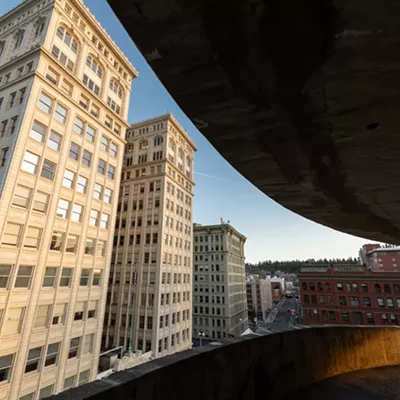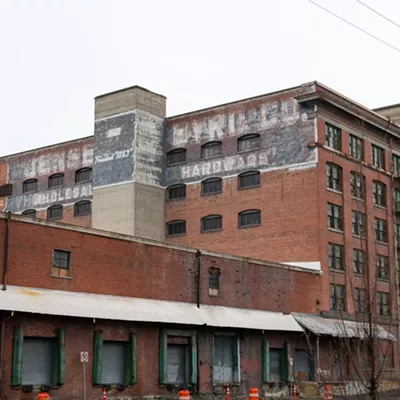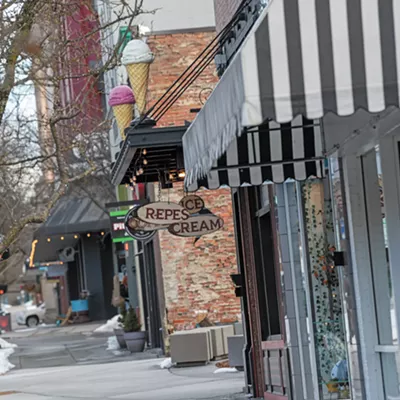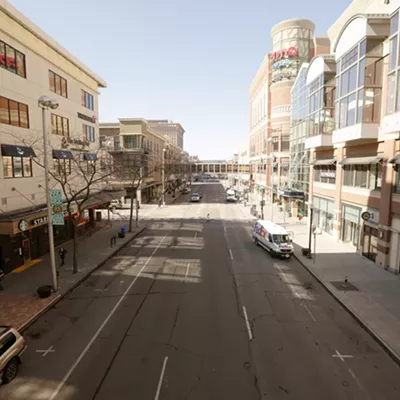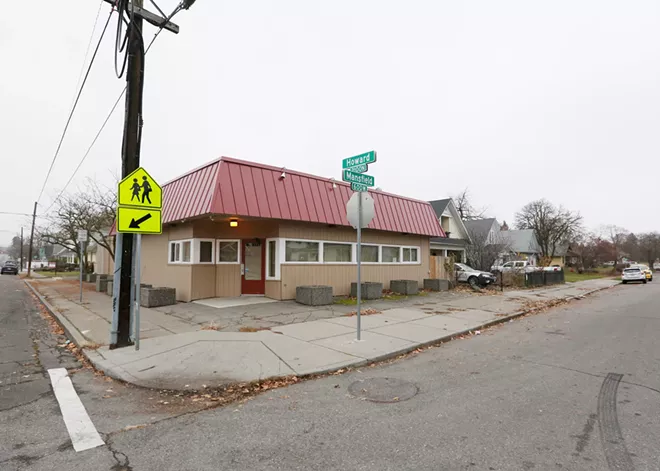
Snacks. Beer. Cigs. Eggs. Candy. Lunch meat. Lotto tickets.
Would you want to live next to a convenience store? For some, a neighborhood mini-mart would be pretty, well, convenient.
But for concerned members of the Emerson-Garfield neighborhood, the possibility of late-night loitering, increased theft, or teenagers passing beer advertisements on their way to nearby North Central High School seems inconvenient at best.
Once a dental lab tucked into a quiet residential neighborhood, the beige single-story building at 601 W. Mansfield Ave. is going through a permitting process to become a convenience store.
Despite well-organized opposition from the Emerson-Garfield neighborhood, the plan for a convenience store will be able to move forward if the new owner is granted a conditional use permit, which can allow buildings in residential zones to be used for businesses.
In 2017, the Spokane City Council adopted an ordinance to reactivate preexisting commercial structures in residential zones by providing permits — with conditions — that allow low-impact businesses such as offices or retail.
Basically, if an owner can prove that a building in a residential area has ever been used for a commercial purpose, they could get a permit to open a business there again (except for businesses involving cannabis, weapons or vehicles).
Seven years ago, 95 buildings around the city fit into this category. The vacant building on Mansfield was one of them.
Emerson-Garfield has one of the most well-attended and enthusiastic neighborhood councils in the city. When members first heard that a grocery store was going to come into their neighborhood, they were thrilled. But once they did some research and realized the store would be more of a mini-mart than a fresh market, they became concerned.
In eight months, they've become permit nerds, crowdsourcing funds to hire an attorney and organizing more than 70 public comments to the city. They are trying to convince the city that the proposed convenience store isn't a low-impact business.
Their efforts highlight a question that many neighborhoods ask when faced with similar situations: How much power does a neighborhood have in guiding its own development?
"There are limits to what the neighborhood can impact, and I think it's important to recognize that in all of this, we're talking about restricting somebody's ability to use the property that they own," says Spencer Gardner, the city's planning director. "When we are restricting somebody's use of their private property, we try to be very careful about that."
Sometimes, people staunchly against development near their homes are accused of being NIMBYs, which stands for "not in my backyard." But for the concerned community members in Emerson-Garfield, it's not that they don't want development, it's that they want to have a meaningful say in improving their neighborhood.
"I don't think it's a matter of us not wanting a business here," says Clayton Elliott, who's been helping oppose the project. "It's a matter of us wanting businesses that come in and are wanting to be part of our community, [that are] working with our neighborhood as a whole and making our neighborhood better, not contributing to already existing problems."

PLANNING
On Dec. 2, about 40 people are gathered under fluorescent lights in what's left of the 1980s dental lab. They represent 27 nearby households, or about a third of the homes within a 400-foot radius that received a notice about tonight's public meeting to discuss the proposed mini-mart with its developer, Dave Nagra.Nagra bought the Mansfield property a few months ago. He's the owner of Ramka Properties, which operates the Amerimart on the corner of 29th Avenue and Myrtle Street on the South Hill, the Amerimart at 104 W. Second Ave. in downtown Spokane, plus a number of gas stations across Eastern Washington and North Idaho.
Nagra applied for a conditional use permit since his plans for the Mansfield address seemed to be well-aligned with its retail history. Before the building was a dental lab, it was a butcher shop, a tailor business and a grocery store.
The conditions of the permit could limit the business' hours, parking, lights or other potential detriments to neighborhood quality of life.
Conditional use permits are one tool allowed by Spokane's overarching comprehensive plan, which guides continued development. Chapter 3 of the plan encourages "complementary types of development" within neighborhoods "serving the daily needs of residents," stipulating that "development of these uses in a manner that avoids negative impacts to surroundings is essential."
The comprehensive plan also aims to "increase the number of locally owned businesses in Spokane," "[expand] the choices available" and "encourage the involvement of citizens in the planning process."
The neighbors gathered here in the vacant building don't think the proposed development meets any of those goals.
They're worried about increased theft and violent crime at a retail shop, especially one with alcohol and tobacco products. They cite the city's 1987 decision that converted the spot from a butcher shop to a dental lab.
While the building was a retail store, it faced three armed robberies in about three decades. Almost forty years ago, the hearing examiner decided that an office would be "more compatible with the surrounding area" because it would "engage in no retail trade."
Neighbors also point to the 300 block of West Indiana Avenue, which is home to Indiana Market just four blocks away. That block has seen at least 10 incidents of theft, assault or vandalism in the last two years, according to Spokane Police Department's crime map and reports to the National Incident-Based Reporting System.
"My husband did have a gun pulled on him earlier this year because he didn't have a cigarette on him at the gas station down the street," says Danielle Smith, who lives next door to the Mansfield building, during the public meeting. "We do not want that right here in a residential area."
"What are you going to do about the people that you bring this way?" another attendee asks. "Because it's going to be your store that's going to bring a lot of that kind of ruckus around here."
Other people say they won't shop at the business because it won't carry the fresh produce they're interested in. There are already five mini-marts surrounding the residential area, though there are none within the neighborhood's boundaries. Smith says that a sixth convenience store within a mile radius doesn't add to a diversity of services in the area like the comprehensive plan promises.
Cherrie Barnett brings up the kids who walk past the building every day on their way to Garfield Elementary. She worries about the impact increased traffic and large delivery trucks would have on their footpath to kindergarten.
"I just really wish you'd let it be for something that's more adaptable to a residential neighborhood," she says, to resounding applause.
PARTICIPATION
But maybe more than anything, these neighbors are upset because this public meeting almost didn't happen.Despite the comprehensive plan's instructions to encourage public participation, Elliott feels like he and his neighbors have had to fight to have their concerns heard.
Elliott has been leading the legal efforts of the neighborhood since spring. He first learned about the application for a conditional use permit from a TV news story in mid-April, which announced the project as a new grocery store.
When a sign went up on the building listing Ramka LLC as the new owner, he and other neighbors looked them up. They found out that Ramka owns multiple gas stations and convenience stores, which didn't align with the neighborhood's expectations of a grocery store — more fresh produce and dry goods than what economists call "demerit goods" like cigarettes and candy.
In Spokane, there is no legal definition of a grocery store. Apples, oranges, eggs, beer, wine, lottery tickets, and tobacco and vaping products are equal examples of groceries under the law.
Nagra says he will sell pantry staples like milk, eggs, coffee creamer, onions and prepackaged deli meat in addition to beer, wine, and tobacco products. But because it's such a small shop, Nagra says it doesn't make sense for him or his customers to sell many fruits or vegetables.
"I cannot compete with the Safeway prices. I cannot compete with Walmart prices," he says. "Now, they're saying 'Put the fresh produce [in there].' But when they see the prices, they're gonna say, 'You're too expensive.'"
In an effort to compromise with the neighborhood, Nagra has agreed not to sell hard liquor or drug paraphernalia, which would otherwise be major profit makers.
Still, the relationship between Nagra and the neighborhood hasn't recovered. It started off on the wrong foot because of mismatched expectations, and it didn't help that Nagra was initially granted a Type II conditional permit on June 27.
A Type II permit is for buildings under 3,000 square feet and doesn't require a public meeting. The Mansfield building is 3,480 square feet. But planning director Gardner was going to let it proceed as a Type II, since the retail floor is 2,950 square feet.
"It's just not a situation we had really faced before, so we couldn't point to precedent for how we would treat those spaces," says Gardner, the planning director. "We made the decision that seemed appropriate."
Elliott and other neighbors disagree.
"It's been a very deceptive process from the beginning," Elliott says.
Within two weeks of the city granting the initial permit, Elliott helped the neighborhood file an appeal to the hearing examiner. They then raised enough on GoFundMe to hire an attorney.
Turns out, the hearing examiner disagreed with the permit process as well. Because of total square footage and clear public interest, he said Nagra needed to apply for a Type III permit instead.
The Type III permit requires developers to hold a lengthier public hearing process in order for neighbors to share what kind of conditions they'd like to have included in the conditional use permit.
"While we as city staff can often anticipate what some of those concerns might be, having the neighborhood show up and express their concerns through comments and through participating in the process is helpful for us on the staff side to understand what kind of conditions might be necessary in order to address those negative impacts," Gardner says.
That's where Gardner says neighborhoods can have the most impact on development near their homes.
If it's within the permit, the city can't restrict what kind of business private property owners can run. But if neighbors come to public hearings with the kinds of conditions or mitigations they'd like planners to impose, Gardner says the city is ready to consider them.
"I take the attitude that all concerns are legitimate on some level," he says. "That doesn't mean that all concerns are going to result in an outcome that the person wants. Ultimately, you hear all those concerns, and then you weigh out against all of the different considerations that need to go into making a decision. That's really the purpose of the process."
Nagra says he's willing to weigh concerns, too. At the public meeting, he wasn't able to come up with any solutions that would mitigate concerns about crime or traffic. But he says the neighbors weren't suggesting solutions, either.
"There was no constructive approach on the neighbors' part, that 'We will work with you like this' or what not," Nagra says. "They said, 'No.'"
Neighbors will find out if their concerns provide enough legal cause to stop the convenience store some time early next year, when the hearing examiner decides whether Nagra will receive the new conditional use permit.
Regardless, if neighborhoods want more say in Spokane's future development, their best shot is to get involved in changing the city's comprehensive plan, which is due for an update by June 2026. The city is planning public meetings soon.
"I think what we're seeing now is, they're just kind of passing these things and it feels like there is no thought behind it," says Smith, who lives next door to the proposed mini-mart. "My hope is that we start to foster more community thoughtfulness for how we utilize urban planning, because that is so important for the revitalization of neighborhoods." ♦
Editor's Note: This story was updated on Monday, Dec. 16, to clarify who is leading the neighborhood opposition and remove a reference to a hearing examiner date that has not yet been scheduled.


